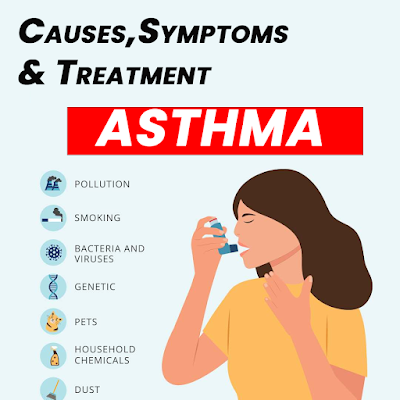A chronic respiratory condition known as asthma affects the airways in the lungs. It causes inflammation and narrowing of the airways, leading to various symptoms such as difficulty breathing, wheezing, coughing, and chest tightness. These symptoms of asthma range from mild to severe and vary intensity over time.
Causes of asthma: Although the precise aetiology of asthma is not entirely known, it is believed to be a result of both hereditary and environmental factors. People with a family history of asthma or allergies are likelier to develop the condition. Exposure to allergens, irritants, respiratory infections, and certain respiratory viruses during childhood can also contribute to the development of asthma.
Symptoms: Asthma symptoms can vary in intensity and may include:
Shortness of breath
Wheezing (a high-pitched whistling sound when breathing)
Coughing, especially at night or early in the morning
Chest tightness or discomfort
Asthma is typically triggered by certain stimuli or factors, known as triggers. Common triggers include:
Allergens: Substances like pollen, dust mites, pet dander, and mould can trigger asthma symptoms in individuals with allergic asthma.
Respiratory Infections: Viral infections like colds and flu can worsen asthma symptoms.
Irritants: Substances like smoke, strong odours, air pollution, and chemical fumes can irritate the airways and trigger asthma symptoms.
Physical Activity: Some people experience exercise-induced asthma symptoms triggered by physical exertion.
Cold Air: Breathing in cold air can cause airway constriction and trigger symptoms.
Emotional Factors: Stress and strong emotions can sometimes trigger asthma symptoms.
Medications: Certain medications worsen asthma symptoms in some individuals.
Asthma is typically diagnosed through medical history, physical examination, and lung function tests. Asthma treatment aims to control symptoms, improve lung function, and minimize the frequency and severity of asthma attacks.
Prevention: Specific measures can reduce the risk of developing or exacerbating symptoms, such as avoiding tobacco smoke, staying away from allergens, maintaining a healthy weight, and following a prescribed treatment plan.
Asthma Treatment By Homeopathy
In addition to medication, asthma management often includes identifying and avoiding triggers, creating an asthma action plan, and monitoring lung function regularly. Individuals with asthma must work closely with their asthma doctor to develop a personalized asthma management plan that suits their needs and helps them lead healthy and active lives.








